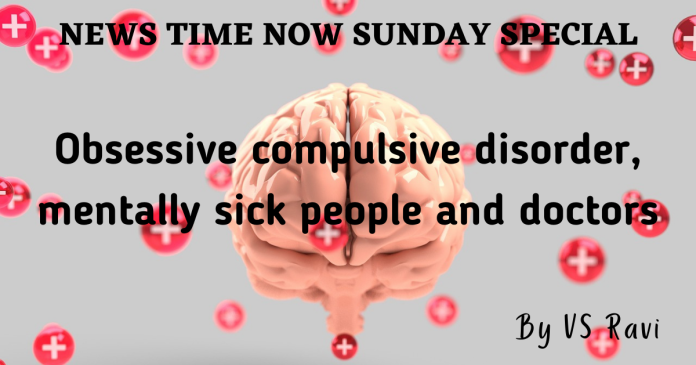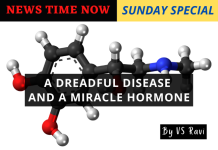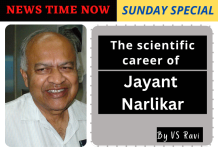There are millions of people who sail through life without having had a single serious disease, thanks to nature’s gift of a strong constitution at birth itself, with all the organs in ‘mint condition’; of course they might have had the usual bouts of minor infections which last for a few days requiring no treatment. They reach adulthood unscathed with no residual effects.
These healthy individuals become incapable of appreciating sickness, to the point of being utterly indifferent to, and even contemptuous of, people suffering from various kinds of ailments. These are the extremely lucky persons, who while gorging themselves with mouthwatering dishes at a restaurant or a feast, take a look at the empty plates of their unfortunate brethren without even feeling sorry for them. On the other hand, they cannot even conceal their annoyance when they notice a person hesitating to taste some dish kept on the table, as though the latter’s presence is an affront to their host’s hospitality.
No wonder for these healthy specimens of the human race who have never had a single stomach ailment, life is a bowl of cherries and not a single moment is wasted. Each day is packed with entertainment and sumptuous feasts (they have the habit of describing each and every dish whether it is Shahi Kurma, or Panneer, Butter Masala (spicy Indian dishes) or strawberry daiquiri (a cocktail) with a vivid gusto and enthusiasm in great detail). They have no pity for those afflicted with agonising and chronic stomach disorders like irritable bowel Syndrome or ‘Crohn’s disease’ or condemned to a restricted diet all their lives by ‘diabetes’, no sympathy for victims of ‘Grand mail seizure , who live in constant fear of another attack all their lives, or little children afflicted with pneumonia whose lungs knock at their ribs ‘against the use of nature’.
I know a man who used to make fun of guests who did not eat well at parties due to some chronic ailments. He would wonder why they had bothered to come to the party spoiling the atmosphere. This man realised what it was to be sick much later, when he himself came down with a serious ailment when his courage vanished like a gambler’s lucky streak.
Let us now come to doctors. By virtue of their profession they may be familiar with the symptoms, diagnostic procedures and treatment of most of the diseases, though they themselves cannot be expected to have had personal experience of every disease apart from their own quota of a few minor ailments. For example, a doctor may know how to treat infective hepatitis, but he himself might have never had it. This is where the problem arises because, when a patient having this terrible ailment, complains about lack of appetite or nausea, the doctor, for no fault of his, cannot experience the same distress. There will always be a gap between his own perception of the patient’s agony and the actual suffering experienced by the patient.
In fact, this is true of almost all the diseases. This gap can never be closed and the only course open for the doctor is to lend a sympathetic ear to the patient’s woes. Since treatment relies to a large extent on reassurance, a doctor who loses patience or snaps at a patient, howsoever number of times he repeats his symptoms, might as well stop practising, instead of giving up the noble principles on which the edifice of medical treatment is built.
Obsessions, on the other hand, are morbid thoughts a person cannot get rid of, however hard he tries, like the fear that he has a particular disease or a terror of heights or closed spaces. Compulsive behaviour manifests itself in a desire to repeatedly touch objects, utter words or checking locks or taps and hypochondriasis. The person is agonisingly restless until he yields to his desire. Even among these, hypochondriasis, the persistent preoccupation with the possibility of having one or more serious diseases, to the point of being incapable of concentrating on anything else, is very agonising and eludes medical treatment. It may just appear as an eccentricity or a nuisance but in the sufferer’s mind there is a hell. Two aspects make it intolerable: the patient’s obsessive fear of having become afflicted with a terminal illness and a simultaneous lack of courage to go in for an investigation, out of a fear that his suspicion may be confirmed. If the person suffers from any of the familiar ailments, such as a minor disorder of the stomach, or throat or urinary tract or exhaustion he may excessively worry that he has cancer. If he has a minor discomfort in his chest he may imagine that he has had a heart attack. There is a tendency on the part of the doctor to merely treat the physical ailment by prescribing a simple drug and prescribe a tranquilliser for the mental component, which does not solve the real problem- the morbid fear of the patient that he has a serious disease.
In the post-Freudian era, hypochondriasis as well as other anxiety neuroses were explained away as ‘punishments’, subconsciously being inflicted by a person on himself for some guilt. Neuroscience has now disproved this and shown that the neurotransmitter called serotonin is the villain. Neurotransmitters carry messages from one neuron (nerve cell) to another by settling in the ‘synapses’, the gaps, between the cells. This makes ‘adaptive’ behaviour possible. If the nerve cells do not allow serotonin to remain there, but reabsorb them through receptors called ‘reuptake pumps’, the person concerned would lose his ability to see options. He would get stuck on thoughts like a broken record—the result, an ‘obsession’ like hypochondriasis.
Hypochondriasis, like other obsessions, remains one of the biggest challenges to medicine, mainly due to a lack of awareness of the functioning of the human brain and also partly because of the callous attitude of doctors (barring a few) who are reluctant to devote their time and energy to an ailment, the treatment of which may not be remunerative. However, some new Serotonin Reuptake inhibitors like Prozac, Fluoxemine, and Mirthzapine which block the reuptake pumps and prevent reabsorption of serotonin, combined with behaviour therapy seem to offer hope.
But hypochondriasis is a chronic illness and so prolonged treatment may be necessary. Hypochondriacs remain in the twilight zone between terminal diseases and other illnesses which respond to treatment. What is worse, they are the butt of ridicule and jokes. Even doctors who should be the first to sympathise with them not only do not take them seriously but also chide them for their fears. Besides being inhuman, such an attitude also shows lack of respect for the dignity of human life.
In a hard-hitting article written in a prestigious magazine, several years ago, a famous scientist drew attention to precisely this aspect and called for dropping the words like ‘anxiety’ and ‘panic’ while referring to society’s attitude towards mental disorders, arguing that even death would be a sweet release compared to the agony of these patients, which according to him only another victim of mental illness can understand. Condemning the stigma attached to mental sickness, he expressed a fond hope that a future presidential candidate’s battle against depression or anxiety would be considered a mark of courage, instead of something to be hidden, and that Prozac could be swallowed openly without embarrassment by people who need it just as a patient with blood pressure takes a beta blocker or Ace- inhibitor today.


















































